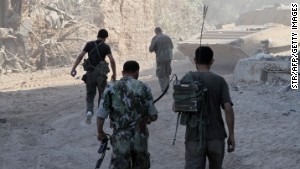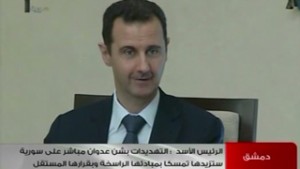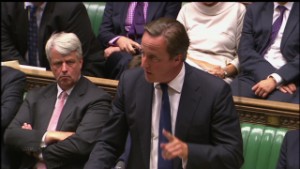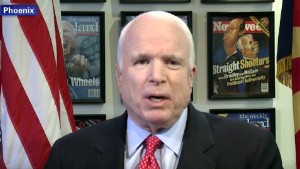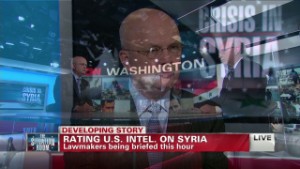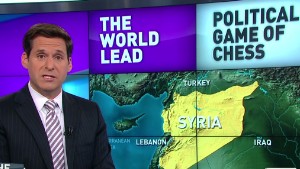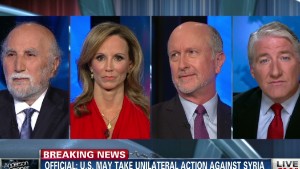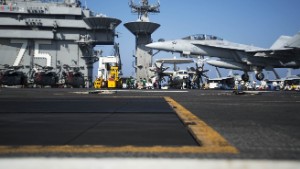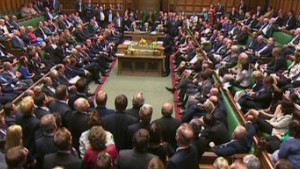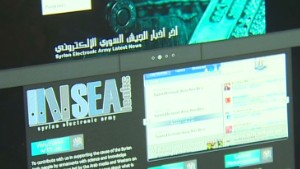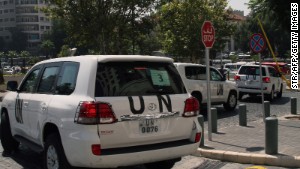U.N. experts got to inspect the site of a reported chemical attack on
civilians near Syria's capital Monday as the United States accused the
Syrian government of trying to cover up the attack.
The U.N. inspectors
entered the town of Moadamiyet al-Sham and appeared to be examining the
area accompanied by doctors, according to videos posted on social media
by Syrian activists. The team had a "very productive" day and will
continue its work Tuesday after examining its findings Monday evening,
U.N. spokesman Farhan Haq said in New York.
Government and opposition
forces have accused each other of unleashing poison gas last week in
the suburban Damascus area of Ghouta. Syria's opposition said that as
many as 1,300 people were killed, prompting new calls for Western powers
to intervene in the country's 2-year-old civil war.
In Washington, U.S.
Secretary of State John Kerry called the use of chemical weapons a
"moral obscenity" that could not go unanswered, and he said Syrian
actions are "not the behavior of a government that has nothing to hide."
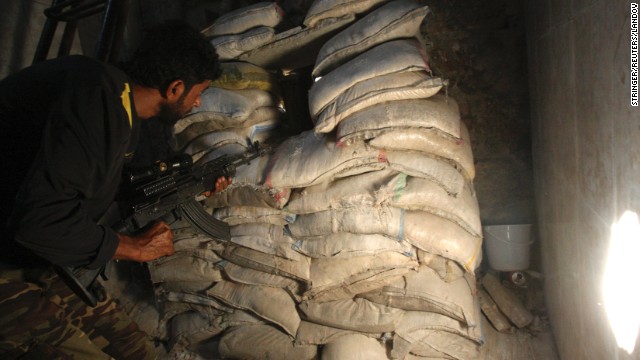 Syrian civil war in photos
Syrian civil war in photos
 Kerry: Chemical use a 'moral obscenity'
Kerry: Chemical use a 'moral obscenity'
 Syria's wounded treated in Israel
Syria's wounded treated in Israel
 Horrific video we must show you
Horrific video we must show you
Kerry stopped short of
directly accusing President Bashar al-Assad's government of a massacre.
But he said, "We know that the Syrian regime maintains custody of these
chemical weapons. We know that the Syrian regime has the capacity to do
this with rockets. We know that the regime has been determined to clear
the opposition from those very places where the attacks took place."
Meanwhile, he said that
Syria was "systemically destroying evidence" of last week's attack by
continuing to shell the area and that the danger the team faced Monday
"only further weakens the regime's credibility." The Obama
administration is now weighing how to respond in talks with U.S. allies
and members of Congress, he said.
"Nothing today is more serious, and nothing is receiving more serious scrutiny," Kerry said.
Monday's examination took
place after unidentified snipers shot multiple times at a vehicle used
by the U.N. team and after an explosion near the site inspectors planned
to visit, the United Nations said. There were no reports of injuries.
U.N. officials did not
say who was behind the shooting or the explosion, which witnesses said
may have been caused by a mortar shell. The Syrian government accused
"terrorists" of firing on the inspectors, Syrian state TV reported.
U.N. Secretary-General
Ban Ki-moon said inspectors visited hospitals, interviewed witnesses,
survivors and doctors and collected some samples. Speaking from Seoul,
South Korea, Ban said he has directed the group to register a "strong
complaint" to government and opposition forces to make sure the team's
safety is guaranteed.
The Syrian government
agreed to grant the inspectors full access on Sunday, pledging to cease
all hostilities as long as the team was on the ground, the United
Nations said. And an umbrella group for the Syrian opposition, the
Syrian National Coalition, said rebel forces would ensure the safety of
any U.N. personnel in the area.
But the government would
not let U.N. inspectors approach the site for days, and the team feared
that the chemical evidence may have dissipated.
Attacks could reinforce poison gas 'taboo'
Middle East analyst
Richard Haass told CNN's The Lead that Kerry's comments "went far out on
a limb" and indicate that a U.S. strike on Syria was in the works, with
or without U.N. Security Council backing. Haass, the president of the
Council on Foreign Relations, said military action was needed "to
underscore the principle, the norm, the taboo that these weapons ought
to have."
"No one, Syria or
anybody else, now and forevermore, should be able to use such weapons,
much less biological or nuclear weapons, with impunity," he said. But he
said Washington should limit its intervention in the conflict, "so we
don't get enmeshed in what I think could become a quagmire."
"If we want to help the
opposition, the best way to do it is through considerable arming of
those elements of the opposition with agendas we can support," he said.
But with Syria already seen as a proxy war that has been
spilling across its neighbors' borders
for months, the prospects for improvement aren't likely to be aided by
American airstrikes, said Andrew Tabler, a senior fellow at the
Washington Institute for Near East Policy.
"This is just going to be one chapter in a very long struggle we have in Syria," Tabler told CNN's The Situation Room.
Russia, Syria's leading
ally, has raised sharp objections to the possibility of any outside
intervention. Foreign Minister Sergey Lavrov said Monday that reports of
the use of chemical weapons must be "thoroughly and professionally
investigated" and submitted to the U.N. Security Council.
At a news conference
Monday, Lavrov said there's no proof yet that the Syrian government was
involved in last week's reported attack. And Sunday, a Foreign Ministry
statement compared the Western allegations against Syria to the claims
that Iraq was hoarding weapons of mass destruction before the U.S.
invasion in 2003 -- claims that fell apart once American troops began
searching for them.
Charles Duelfer, the
former head of U.S. weapons inspection teams in Iraq, said the U.N.
experts will be looking to collect evidence from witnesses and survivors
of last week's attack, including samples that can be analyzed later.
"They'll be looking for
remnants of the munitions, which could be sophisticated munitions that a
military would have -- or if it turns out, unexpectedly, to be the case
that the insurgents had cobbled together some sort of CW capability,
maybe they'll find that," Duelfer said.
Duelfer said he expects
the U.S. government has its own sources: "Presumably, the National
Security Agency can listen to people besides the United States, so they
may have data which the weapons inspectors may not have," he told The
Situation Room. But while Washington's evidence may be solid, U.N.
inspectors "provide credibility across the board."
"When they say
something, presumably all countries will say. 'OK, we can accept that,
they don't have a dog in that fight,' " Duelfer said.
U.S. officials have said
they have no credible evidence pointing to opposition groups using
chemical weapons. And the Obama administration is expected to declassify
the intelligence assessment backing up its assertion that the Syrian
regime was responsible for last week's attack before any U.S. military
action would take place, a senior administration official said Monday.
That evidence "includes
but is not limited to" satellite images of activity at Syrian military
installations identified as including chemical weapons depots, a senior
administration official familiar with the intelligence told CNN.
And Kerry said he had
argued to Syrian Foreign Minister Walid Moallem last week that if the
government had nothing to hide, "then their response should be
immediate: immediate transparency, immediate access, not shelling."
"Failure to permit that, I told him, would tell its own story," he said.
Al-Assad: It wasn't us
The Pentagon has sent
four warships armed with cruise missiles to the region, and Obama will
be presented with final options regarding actions against Syria in the
next few days, a senior administration official said Monday.
But as U.S. muscle plows
the waters of the eastern Mediterranean Sea, al-Assad on Monday
repeated his government's denial that his army had anything to do with
the use of poison gas.
"The area of the claimed
attack is in contiguity with the Syrian army positions, so how is it
possible that any country would use chemical weapons in an area where
its own forces are located?" he asked in an interview with Russian
newspaper Izvestia.
Al-Assad accused the
United States, Britain and France of exploiting the incident by trying
to verify rebel allegations instead of verifying facts.
The use of a large
amount of chemical weapons would cross a "red line" and threaten U.S.
interests in the region, Obama announced last year. Tabler, who has had
extensive contacts with al-Assad, said the Syrian leader may have
watched as Washington reacted cautiously to previous reports of chemical
warfare and gambled incorrectly that last week's attack would draw a
similar response.
"I think he thought that
he could push the envelope again and that he could actually show his
own people that no one is going to come to their rescue," Tabler said.
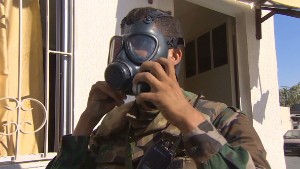 Syria agrees to let U.N. investigate
Syria agrees to let U.N. investigate
 World reacts to alleged chemical attack
World reacts to alleged chemical attack
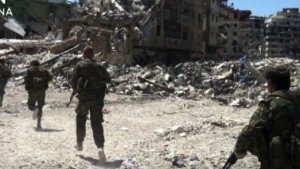 McCain: Obama 'too cautious' on Syria
McCain: Obama 'too cautious' on Syria
Syrian opposition's war strategy
Opposition accusations
Opposition members say
rockets with chemical payloads were among the ordnance government troops
unleashed at the rebel stronghold of Ghouta early Wednesday. More than
1,300 people died, most of them by gas, according to opposition
spokesman Khaled al-Saleh.
The opposition backed up
the allegations with gruesome video of rows of dead bodies, including
women and children. They had no visible wounds, and some appeared to be
bloated. The aid agency Medecins sans Frontieres said three hospitals it
supports in Syria's Damascus governorate reported having received about
3,600 patients displaying neurotoxic symptoms on Wednesday morning.
But according to Syrian
state-run television's depiction of events, government forces came into
contact with a gas attack on Saturday in Jobar, on the edge of Damascus.
Several of the soldiers were "suffocating" from exposure to gases as
they entered the city, according to state TV.
"It is believed that the
terrorists have used chemical weapons in the area," Syrian TV reported,
citing an anonymous source. The government uses the term "terrorists"
to describe rebel forces.
Broadcast video showed a
room containing gas masks, gas canisters and other paraphernalia that
could be used in a gas attack. The army said it uncovered the cache in a
storage facility in the area.
CNN could not independently confirm the authenticity of video shown by the government or rebels.
 Weapons found on North Korean ship
Weapons found on North Korean ship
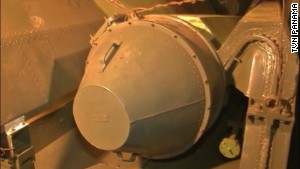 Cuba: Weapons on N. Korean ship are ours
Cuba: Weapons on N. Korean ship are ours
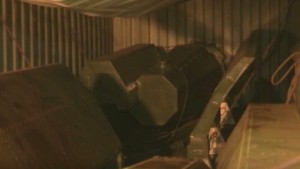 Ship seized
Ship seized
